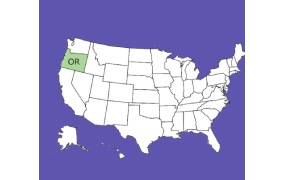Author Aaron Pelley

In addition to representing cannabis clients and their business interests, Aaron has earned a reputation for effective high profile litigation. His representative cases convey his ability to handle a diversity of complex legal matters. He has also been invited to speak at Legal Education Seminars and Cannabis Conferences throughout the U.S. and has been repeatedly named a “Rising Star” by Super Lawyers and a Top 100 Trial Lawyer by the National Trial Lawyers. Aaron is personally and professionally passionate about advancing the interests of a legitimate and integrous cannabis industry, establishing and enforcing equitable relationships among business partners, and supporting and promoting the end of the war on cannabis.
Despite being the fourth state to legalize recreational cannabis nearly a decade ago by now, Oregon has seen major issues arise in the state’s cannabis industry. Firstly, the oversupply and lack of demand given the state’s population has caused the price per pound of cannabis to be on an economic freefall, with the average price dropping anywhere from 16-25 percent with each year that passes. Cannabis flower runs for about $4 a gram and total Oregon cannabis sales in 2022 fell by 17 percent according to the Oregon Liquor and Cannabis Commission’s annual report to the Legislature.
“The Oregon recreational marijuana market is in arguably the weakest economic position it has been in since the inception of the program in 2016 due to a decrease in the growth of demand in Oregon, a production cycle that responds to market signals on a lag, and increasing stockpiles of inventory.” the report summarized. “The overabundance of supply throughout 2021 and 2022 resulted in historically low wholesale and retail prices for both usable marijuana and concentrate/extract products. The declining prices, in combination with a tempering in the growth of quantities purchased, resulted in the first-ever decrease in annual sales (from $1.2 billion in 2021 to $994 million in 2022).”
Even though Oregon’s cannabis tax rate of 17 percent is far more modest than any of its neighbors, the competition with the absurdly high number of other dispensaries in the state, 833 as of January 2023, makes operating a cannabis business not nearly as profitable as it would be in other states. The sharp yearly decline in sales and subsequent lost tax revenue has made the OLCC take interesting but likely necessary measures when it comes to retail cannabis expansion and assigning future cannabis licenses.
Another huge internal issue facing the Oregon cannabis industry actually doesn’t involve the cost of cannabis per pound or per gram or really anything to do with the wholesale versus retail price of the products themselves. This issue has become so commonplace to the point where it’s cost millions in lost tax revenue from the statewide industry. The issue revolves around the noticeable amount of dispensaries and cannabis operations that haven’t been paying their state taxes over the years.
Apparently, nearly 10 percent of Oregon dispensaries had unpaid and delinquent back taxes according to the Department of Revenue. The matter of delinquent taxes has become such a widespread issue that Governor Tina Kotek herself authorized the OLCC to withhold not only future licenses but also license renewals from cannabis companies that have unpaid state taxes. Whereas dispensaries were previously able to operate uninterrupted even if the store had millions in unpaid back taxes, the policy will now be changing drastically from the apparently relaxed policies regarding collecting taxes.
For an example of how costly these unpaid taxes and subsequent costs have become for the state, just one dispensary owed nearly $1.5 million in unpaid taxes. And considering this is an issue impacting nearly 80-85 dispensaries in Oregon, that dollar amount of unpaid taxes could reach as high as $100 million if the $1.5 million amount is an average. And given that $311 million was collected in cannabis tax revenue from 2019-2021, nearly 10 percent of that revenue going unfulfilled is quite a considerable number.
“Oregon’s cannabis industry is important to the state’s economy, and the sales tax it generates is vital to the state’s budget,” Craig Prins, interim director of the OLCC, said in a statement. “That’s why it’s critically important for us to get this group of licensees into compliance and pay their fair share.”
9 percent of dispensaries having unpaid back taxes may seem like a small percentage. But when one is talking about a cannabis market as large as Oregon’s with nearly 900 licensed retailers, that’s several million dollars in unsold cannabis products and several hundred Oregonians without a job if those stores were to cease operations entirely. At the same time however, an underfunded regulatory body could result in tainted products and many other issues for consumers as well as malfeasance among cannabis employees and the higher ups. Either way, Oregon’s 20 percent tax rate is nothing compared to Washington’s absurdly high 37 percent tax rate.
As this ordinance has only recently been enacted, the possible economic and employment-related outcome of this measure has yet to be observed. However, there likely will be a brief disruption in the industry as this measure becomes reality amid a statewide market with a delinquent tax problem of this magnitude. On top of the already sinking costs of wholesale and retail cannabis as well as the steep fall of total cannabis sales in 2022, the fallout of this new measure enacted by Governor Kotek will likely be magnified as the state of Oregon continues to experience hardships in their statewide industry.





